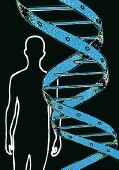
WEDNESDAY, April 13 (HealthDay News) — People with certain variations in a gene called GABRA2 have an increased risk for alcoholism, a new study has found.
When under stress, people with these gene variations tend to act impulsively, which can lead to the development of drinking problems, explained the study’s lead author, Sandra Villafuerte, a research investigator at the Molecular and Behavioral Neuroscience Institute and the department of psychiatry at the University of Michigan.
She and her colleagues looked at 449 people from 173 families, including 129 families with at least one member who had been diagnosed with alcohol dependence or abuse.
The investigators also used functional MRI scans to observe changes in blood flow in the brains of 44 young adults from these families as they anticipated winning or losing money. This enabled the researchers to see how variations in GABRA2 affect the brain’s response in various situations.
The brain scans revealed that people with one form of the GABRA2 associated with alcoholism had greatly increased levels of activation in an area of the brain called the insula when they were anticipating rewards or losses. Previous research had found an association between the insula and addictive behavior.
“We believe these results suggest GABRA2 exerts an influence on an underlying neural system that impacts early risk factors and, later, alcohol dependency,” Margit Burmeister, a research professor at the institute, a professor of psychiatry and human genetics at the university’s medical school and the study’s senior author, said in a university news release. “In the future, we hope to further examine the effects of family environment and other behavioral and environmental factors.”
Genetic risk factors don’t act alone and having them does not automatically mean that someone will become an alcoholic, the researchers emphasized.
The study was published online April 12 in Molecular Psychiatry.
More information
The U.S. National Institute on Alcohol Abuse and Alcoholism has more about alcoholism.

